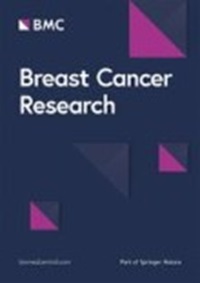A triple hormone receptor ER, AR, and VDR signature is a robust prognosis predictor in breast cancer
IF 5.6
1区 医学
Q1 ONCOLOGY
引用次数: 0
Abstract
Despite evidence indicating the dominance of cell-of-origin signatures in molecular tumor patterns, translating these genome-wide patterns into actionable insights has been challenging. This study introduces breast cancer cell-of-origin signatures that offer significant prognostic value across all breast cancer subtypes and various clinical cohorts, compared to previously developed genomic signatures. We previously reported that triple hormone receptor (THR) co-expression patterns of androgen (AR), estrogen (ER), and vitamin D (VDR) receptors are maintained at the protein level in human breast cancers. Here, we developed corresponding mRNA signatures (THR-50 and THR-70) based on these patterns to categorize breast tumors by their THR expression levels. The THR mRNA signatures were evaluated across 56 breast cancer datasets (5040 patients) using Kaplan–Meier survival analysis, Cox proportional hazard regression, and unsupervised clustering. The THR signatures effectively predict both overall and progression-free survival across all evaluated datasets, independent of subtype, grade, or treatment status, suggesting improvement over existing prognostic signatures. Furthermore, they delineate three distinct ER-positive breast cancer subtypes with significant survival in differences—expanding on the conventional two subtypes. Additionally, coupling THR-70 with an immune signature identifies a predominantly ER-negative breast cancer subgroup with a highly favorable prognosis, comparable to ER-positive cases, as well as an ER-negative subgroup with notably poor outcome, characterized by a 15-fold shorter survival. The THR cell-of-origin signature introduces a novel dimension to breast cancer biology, potentially serving as a robust foundation for integrating additional prognostic biomarkers. These signatures offer utility as a prognostic index for stratifying existing breast cancer subtypes and for de novo classification of breast cancer cases. Moreover, THR signatures may also hold promise in predicting hormone treatment responses targeting AR and/or VDR.ER、AR 和 VDR 三重激素受体特征是预测乳腺癌预后的可靠指标
尽管有证据表明原发细胞特征在肿瘤分子模式中占主导地位,但将这些全基因组模式转化为可操作的洞察力一直具有挑战性。本研究介绍了乳腺癌原发细胞特征,与以前开发的基因组特征相比,这些特征在所有乳腺癌亚型和各种临床队列中都具有显著的预后价值。我们以前曾报道过,在人类乳腺癌中,雄激素(AR)、雌激素(ER)和维生素 D(VDR)受体的三重激素受体(THR)共表达模式在蛋白质水平上保持不变。在此,我们根据这些模式开发了相应的 mRNA 标识(THR-50 和 THR-70),以根据 THR 表达水平对乳腺肿瘤进行分类。我们使用 Kaplan-Meier 生存分析、Cox 比例危险回归和无监督聚类对 56 个乳腺癌数据集(5040 名患者)中的 THR mRNA 特征进行了评估。在所有评估的数据集中,THR特征都能有效预测总生存期和无进展生存期,不受亚型、分级或治疗状态的影响,这表明THR特征优于现有的预后特征。此外,他们还划分出三种不同的ER阳性乳腺癌亚型,这些亚型在传统的两种亚型的基础上扩大了生存期。此外,将 THR-70 与免疫特征相结合,还发现了一个以 ER 阴性为主的乳腺癌亚组,其预后非常好,与 ER 阳性病例相当;同时也发现了一个 ER 阴性亚组,其预后明显较差,生存期缩短了 15 倍。THR原发细胞特征为乳腺癌生物学引入了一个新的维度,有可能为整合其他预后生物标志物奠定坚实的基础。这些特征为现有乳腺癌亚型的分层和乳腺癌病例的新分类提供了有用的预后指标。此外,THR特征还有望预测针对AR和/或VDR的激素治疗反应。
本文章由计算机程序翻译,如有差异,请以英文原文为准。
求助全文
约1分钟内获得全文
求助全文
来源期刊

Breast Cancer Research
医学-肿瘤学
自引率
0.00%
发文量
76
期刊介绍:
Breast Cancer Research is an international, peer-reviewed online journal, publishing original research, reviews, editorials and reports. Open access research articles of exceptional interest are published in all areas of biology and medicine relevant to breast cancer, including normal mammary gland biology, with special emphasis on the genetic, biochemical, and cellular basis of breast cancer. In addition to basic research, the journal publishes preclinical, translational and clinical studies with a biological basis, including Phase I and Phase II trials.
 求助内容:
求助内容: 应助结果提醒方式:
应助结果提醒方式:


